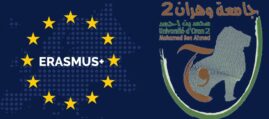KEY ACTION 1 – MOBILITY OF INDIVIDUALS
This Key Action supports:
- Mobility of learners and staff: opportunities for pupils, students, trainees and young people, as well as for professors, teachers, trainers, youth workers, sport coaches, staff of education institutions and civil society organisations to undertake a learning and/or professional experience in another country. This Action is open for Algeria with exception of school and adult education mobility.
- Youth participation activities: youth-led local and transnational initiatives run by informal groups of young people and/or youth organisations to help young people engage and learn to participate in democratic life, raising awareness about European Union common values and fundamental rights, bringing together young people and decision makers at local, national and European level, as well as contributing to European Union common goals.
- DiscoverEU: action offering 18-year-olds the opportunity to have a short-term individual or group travel experience throughout Europe. As an informal learning activity, DiscoverEU aims at fostering the sense of belonging to the European Union of the participants and allow them to explore its cultural diversity. It also seeks to equip the young people with skills and competences of value to their future lives, as well as inspire them to embrace sustainable travel in particular and environmental conscience in general. DiscoverEU includes a general action, where the young people can apply directly on the European Youth Portal as well as an inclusion action. The DiscoverEU Inclusion Action targets young people with fewer opportunities to facilitate their participation in DiscoverEU on equal footing with their peers. This Action is not open for Algeria.
- The Programme offers language learning opportunities to participants carrying out a mobility activity abroad. This support is mainly offered via the Erasmus+ Online Language Support (OLS) tool, adapted as necessary to individual sectors, as e-learning offers advantages for language learning in terms of access and flexibility. In particular cases, that is, when online learning is not the best tool to reach the target group, additional forms of language support will be offered.
- Virtual exchanges in higher education and youth: online people-to-people activities that promote intercultural dialogue and soft skills development between individuals from third countries not associated to the Programme, EU Member States or third countries associated to the Programme. They take place in small groups and are always moderated by a trained facilitator.
